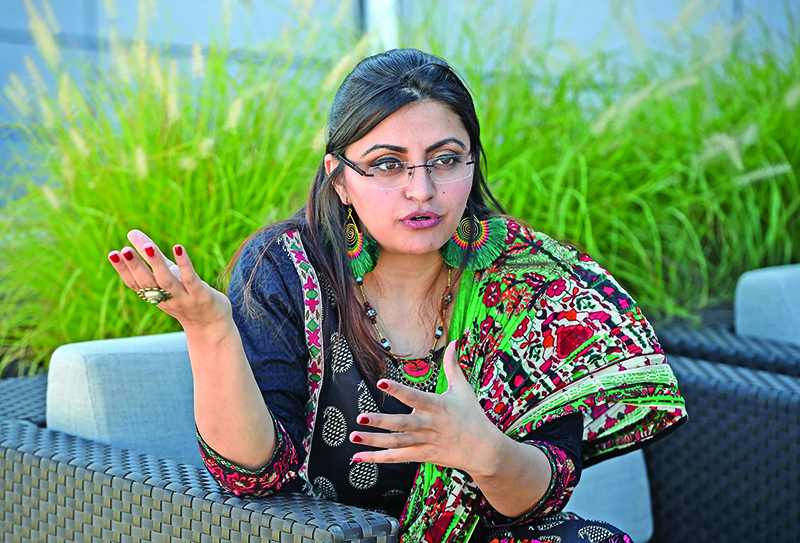

WASHINGTON:Gulalai Ismail's campaigns to empower Pakistani girls have won herinternational awards and recognition as one of her country's foremostactivists. But when she spoke out against sexual violence and disappearancesallegedly carried out by the army in northwestern Pakistan, her fortunesquickly changed.
The 32-year-oldsaid she feared for her life. After four months on the run, she succeeded ineluding a vast hunt and has turned up in the United States, where she isseeking asylum. Ismail said she never sought to become an overseas dissidentbut sees a closing of the political space in Pakistan, where the army hasremained the dominant power-broker for most of the country's history. "Inever wanted to leave Pakistan," she told AFP in an interview inWashington. "I believe that I can better work towards democracy and civilsupremacy and peace in Pakistan."
But she concludedshe would be more effective abroad, saying: "If I had ended up in prisonand tortured for many years, my voice would have been silenced." Ismail,who speaks with poise and passion though she remains afraid, believed she poseda special threat as a vocal woman. "When a man stands up, he is mostlyagainst the state oppression," she said. "But when a woman stands up,she is fighting oppression on many levels -- fighting cultural norms, fightingthe patriarchy and the state oppression."
Taking up anunpopular cause
Ismail was stilla teenager when she co-founded Aware Girls in 2002, which promotes genderequality in the deeply conservative northwestern district of KhyberPakhtunkhwa. In 2017, she won the prestigious Anna Politkovskaya Award forhuman rights advocacy. The year before, she was honored for conflict preventionby France's Chirac Foundation and has been welcomed by former first ladyMichelle Obama. But she came under greater scrutiny last year when she startedspeaking in support of the Pashtun Protection Movement, which defends therights of the Pashtun tribal population in the northwest.
Quotingwitnesses, Ismail said the army crackdown on Pashtun militants near the borderwith Afghanistan had led to frequent disappearances as well as sexual assaults.Most women stay silent due to stigma, she said, but when a boy came forwardabout how security forces were barging into their home and harassing hismother, she went to investigate. "Dozens of women had come to tell us thatthe incident of sexual harassment was not unique. It is systematic. It had beenhappening for years."
Eluding intensesearch
Ismail wasdetained briefly in 2018 but her fears mounted in February when she was takeninto custody for two days after attempting to hold a news conference. She saidthat she was held in a cold, dirty room with a urine-soaked sheet on theground. She said she was denied food and water, with other female inmateswarned against talking to the "high-profile terrorist."
In May, policefiled a complaint against Ismail under an anti-terrorism law after she spokeout about the rape and murder of a 10-year-old girl. Ismail declined to discusshow she escaped Pakistan, saying she did not want to put others at risk.Authorities widely circulated her name to seek her arrest, with airportauthorities told not to let her leave. "There were videos created onlineby military trolls which were clearly saying that the moment I'm in custodythey will teach me a lesson. I spoke about the issue of rape -- now they will'teach me' what rape is," she said.
She said securityforces roughed up both her driver and a friend who she said was handcuffed,beaten and administered electric shocks for 14 hours in a bid to extractinformation on her whereabouts. Ismail is living for now with her sister in NewYork. She said her initial fears of being sent back to Pakistan, a historically of the United States, were eased after she held meetings in Washington atthe State Department and with staff of lawmakers including Chuck Schumer, whorepresents New York and is the top Democrat in the Senate.
"I was toldthat there was no chance that the US will ever take such action as extraditingme or handing me over because they know that it is a case of politicalrevenge," she said. But she remains worried for her parents in Pakistan.She said that they have become socially isolated, with security forcesinterrogating anyone who does so much as text them. "I wanted to speakfreely and that's why I'm here," she said. "However, when it comes tothe future of Pakistan, I do not see a prosperous Pakistan until the militaryestablishment decides it needs to go back to its barracks."- AFP

